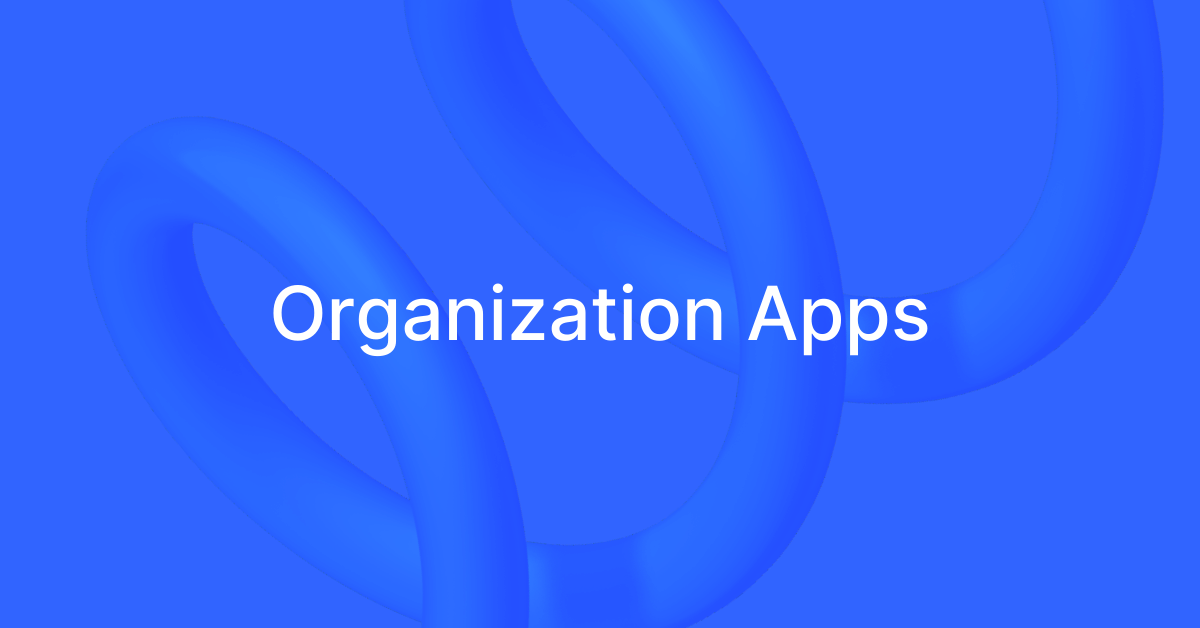
10 Best Organization Apps to Try in 2025 [Life & Work]
Record, transcribe and summarize conversations with one click.
Staying organized in today’s fast-paced world isn’t easy.
Between managing work tasks, personal projects, and everything in between, it’s easy to feel overwhelmed.
That’s where organization apps come in. These tools are designed to streamline your workflow, boost productivity, and give you back some precious time.
In this guide, we’ve rounded up the best organization apps for every scenario—whether you’re tackling big projects, managing daily tasks, or brainstorming your next big idea. So if you're looking to get one such app for your work or life, this guide is for you.
Our top picks for best organization apps
Here's a quick overview of the apps discussed in this article:
| Organization app | Starting price* | Standout feature | Best for |
|---|---|---|---|
| Notta | $8.17 USD | Accurate automated meeting notes | Meeting notes |
| Todoist | $5 USD | Automates reminder creation | Tasks |
| Notion | $10 USD | Flexible workspace design | Complex projects |
| Clockify | $3.99 USD | Automated time tracking | Time management |
| $4.99 USD | Saves content for offline use | Digital reading lists | |
| Obsidian | $50 USD, annual | Mind-mapping tool | Ideas |
| Buffer | $5 USD | Sync posts across 11 social channels | Social media posts |
| Microsoft OneNote | Free | Infinite canvas for arranging notes | Multimedia notes |
| Apple Reminders | Free | Syncs across all Apple devices | Apple fans |
| Zapier | $19.95 USD | Integrates with over 7000 apps | Automating repetitive tasks |
*Monthly cost per user unless otherwise specified, as of January 2025
Benefits of using organization apps for life and work
If you've ever felt like there aren't enough hours in the day, an organization app could be the key to regaining control over your time. They can even reduce stress by ensuring you never forget a task or detail. Even if you're already productive, the right app can dramatically boost your efficiency by simplifying and automating repetitive tasks.
Most organization and productivity apps are designed for workplace tasks, but there are still plenty of excellent tools to help you organize your personal life. Even a simple task manager can help you maintain a sense of control when your schedule gets busy. The only difficult part is finding the perfect app for your organizational needs!
List of the must-try 10 organization apps
1. Notta: Best for organizing meeting notes
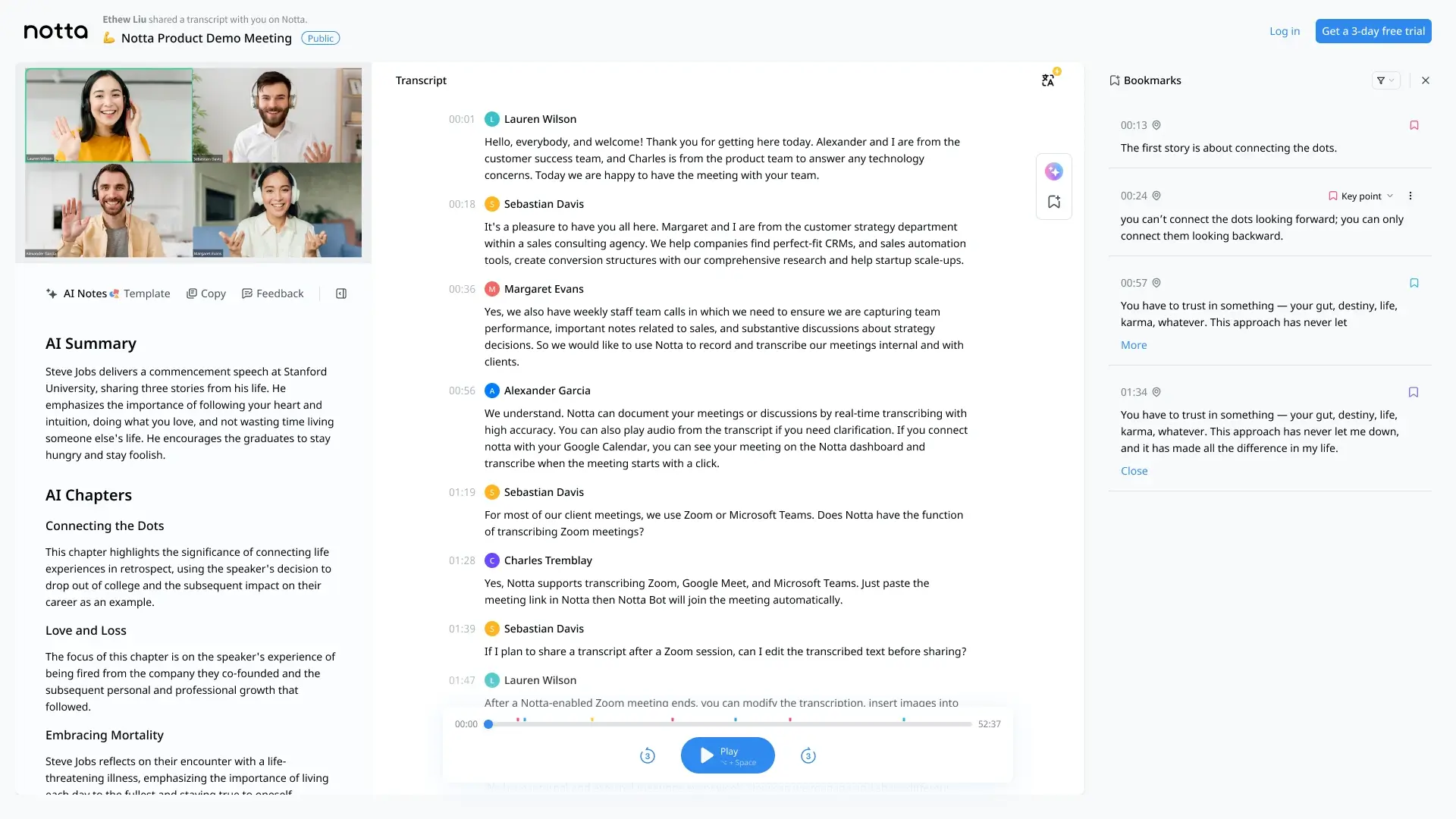
Notta is an AI-powered solution for automatically creating, summarizing, and searching meeting notes. It records and transcribes in-person and virtual meetings using Teams, Zoom, Webex, and Google Meet with up to 98% accuracy in 58 languages. After your meeting ends, you can automatically generate AI-powered summaries that organize your meeting transcripts into key points, decisions, and action items or create fully custom reports using natural language prompts.
One of the most valuable organizational features is chatting with an AI assistant about the contents of all your notes to gain additional insights. The AI assistant acts like an intelligent search engine for your meeting notes, so you can always find the data you need without spending time tagging notes by hand.
Notta is available on the web, as an Android/iOS mobile app, and as a Chrome extension, so you're always prepared for an unexpected call or unscheduled meeting.
| Pros | Cons |
|---|---|
| Extremely accurate transcription | No easy way to type your own notes |
| Offers a complete meeting note workflow | |
| AI assistant dramatically simplifies note organization |
Pricing
Paid plans start at $8.17 USD per user per month. A limited free plan is also available, or you can test out all the features of a 'Pro' paid plan during a 3-day free trial.
Notta offers the most integrated AI meeting notes, summaries, and action items so nothing gets missed.
2. Todoist - Best for organizing tasks
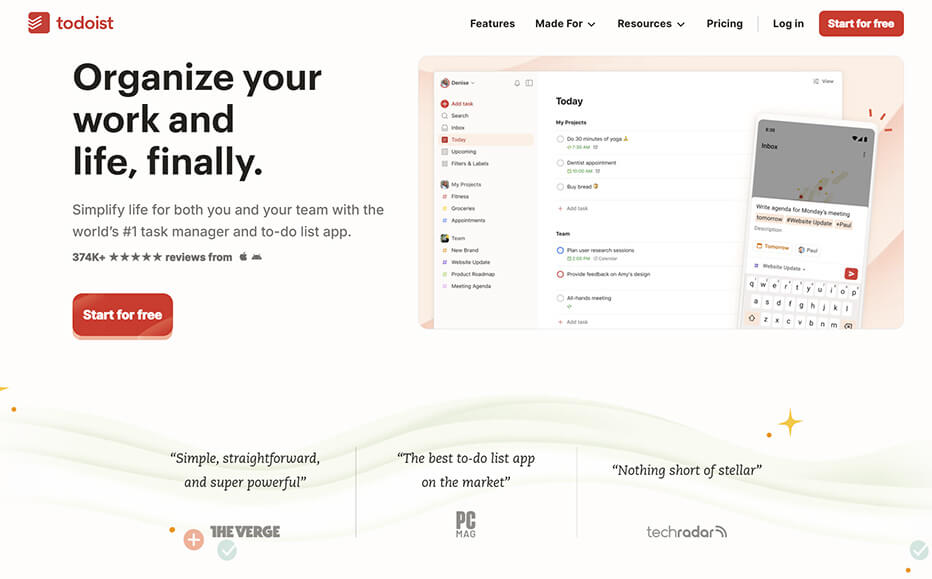
After more than 17 years of development, Todoist is one of the most popular task management apps, largely thanks to its simple yet powerful interface. While many of its advanced features are designed for team collaboration, it's also great for managing your personal tasks.
Todoist does an excellent job of streamlining the process of adding new tasks, which makes it far easier to commit to using it. If you add references to times, dates, or people in your task titles, Todoist will automatically create reminders for you. You can create sub-tasks, add custom reminders, and filter your current to-do list so you know exactly what to focus on.
Todoist is available on the web, Android/iOS, wearable devices, browser extensions, and even through email add-ons to ensure you never miss a reminder or forget a new task.
| Pros | Cons |
|---|---|
| Extremely user-friendly interface | Free plan is too limited for heavy usage |
| Natural language processing during task entry simplifies reminder creation | |
| Zapier integration helps to automate some tasks |
Pricing
Paid plans start at $5 USD per user per month. A limited free plan is also available.
3. Notion - Best for organizing complex projects
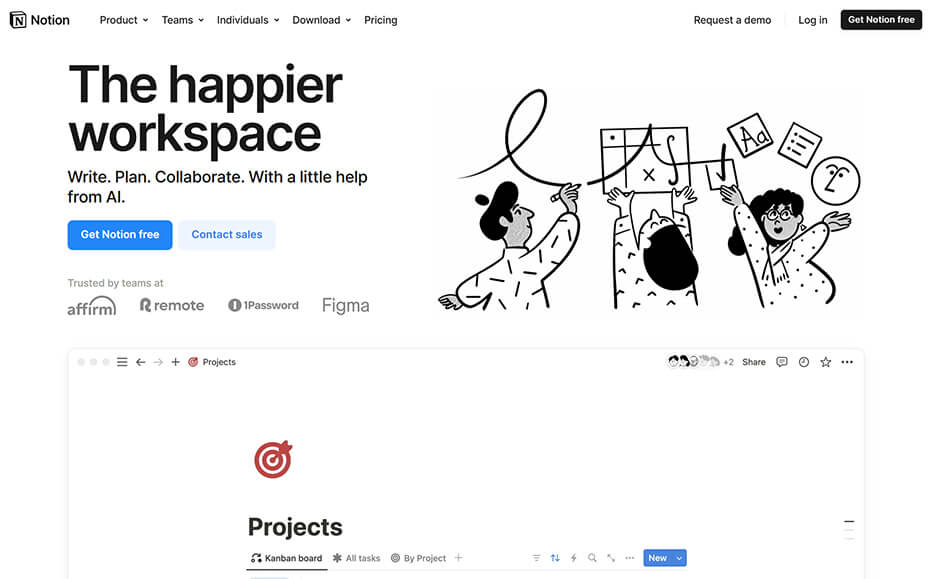
Notion originally started as a digital notepad, but it has since developed into a flexible and customizable program that enhances group collaboration on complex projects. It's designed to help small teams manage long-term projects and all the associated information that goes along with them, from meeting notes to internal reference docs to pitch decks.
Like almost every other app in the last few years, Notion has added an AI assistant with a conversational interface. Notion AI can extract, analyze, and report data from your Notion account, and you can select other apps and sites as sources to ensure that your AI results are based on trustworthy data. However, AI access requires a separate purchase in addition to your usual monthly fee.
Notion is also available for personal use, although most individual users will be satisfied with the free plan. It is available on the web, as a desktop app for PC and Mac, and as a mobile app for Android/iOS.
| Pros | Cons |
|---|---|
| Free plan available for personal use | AI features require additional purchase |
| Supports collaborative editing for teams |
Pricing
Paid plans start at $10 USD per month, and the Notion AI add-on costs an additional $8 USD per month. A free plan is available with usage limits and feature restrictions.
4. Clockify - Best for organizing your time
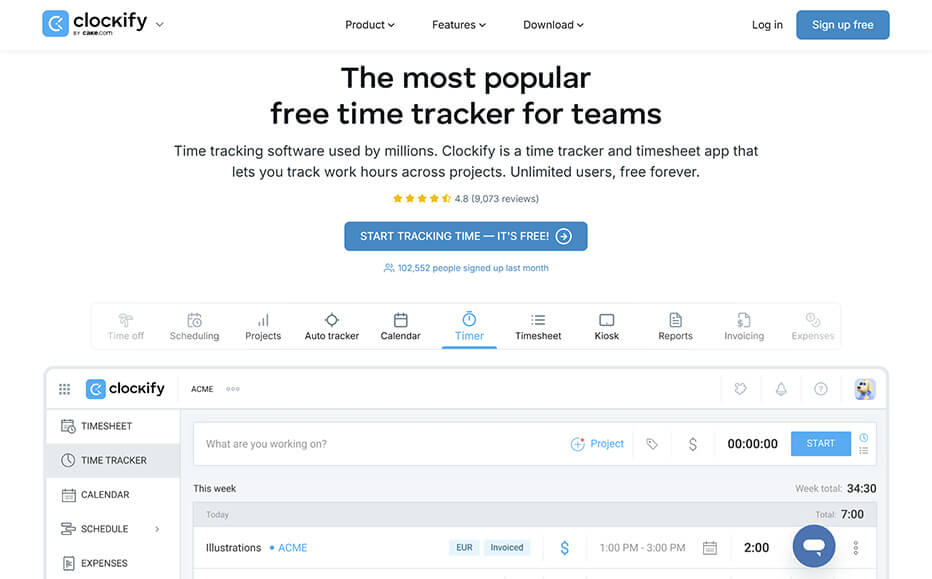
Clockify offers an impressive set of time-keeping features for freelance professionals and small businesses who need help tracking their work hours. Whether you want to track billable time to the minute, prepare invoices, or plan your weekly staff schedule, Clockify can simplify the process.
If you're really committed to productivity, Clockify can analyze your daily tasks and provide reports on where you spend most of your time to help you identify areas for improvement. It can even track your time based on individual app and website usage for personal use or to ensure your team stays focused.
Clockify is available on the web, as a desktop app, and on Android/iOS mobile devices. You can even install it in Kiosk mode for employee clock-in tracking, although this use case has a different pricing structure.
| Pros | Cons |
|---|---|
| Free plan has enough features for serious work | Confusing pricing structure for Kiosk mode |
| Handy Pomodoro timer | |
| Detailed automatic reporting features |
Pricing
Paid plans start at $3.99 USD per user per month, although many individuals and small teams will be satisfied with the generous free plan.
5. Pocket - Best for organizing your reading list
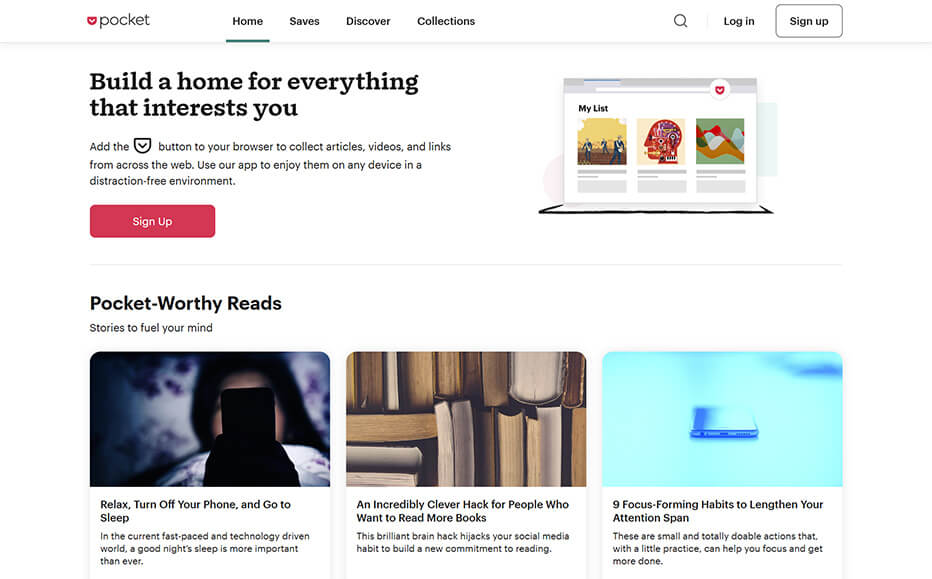
The internet is filled with more fascinating articles, videos, and podcasts than we have the time for. Pocket allows you to keep track of all the content you want to read, watch, and listen to later, even across multiple devices. It's owned by Mozilla and integrated into Firefox, but it's also available for Android, iOS, and a Chrome extension.
The free version will save an ad-free copy of your chosen content for offline usage, while the paid version creates a permanent library of content you've saved so you can access it forever, even if the original is deleted or removed from the web.
Many people will be happy with the free version of Pocket for organizing their reading list, although the paid plan has some other interesting advantages, including smart tagging, full-text search, and even your choice of premium fonts for improved readability.
| Pros | Cons |
|---|---|
| Very easy to use | Free version displays sponsored posts |
| Saved content can be viewed offline | |
| Permanent library preserves content even if the original is removed from the web |
Pricing
Pocket only offers one paid plan priced at $4.99 USD per month. A free version is also available with limited features.
6. Obsidian - Best for organizing your ideas
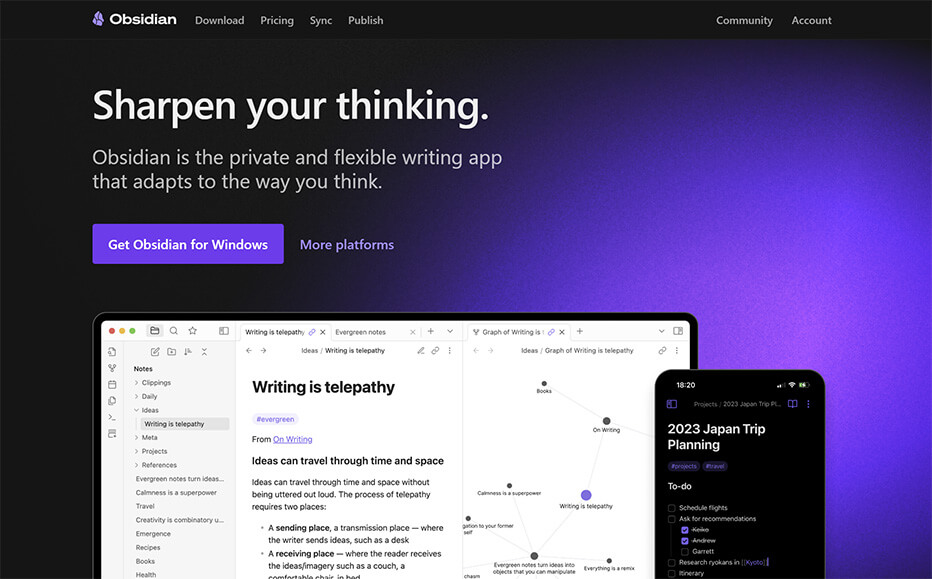
Obsidian is a simple but flexible note-taking app emphasizing privacy, so all your data is stored on your device instead of the cloud. You can link related notes together within the text of each note or visualize the connections between ideas with a graphical mind map. There's also 'Canvas' mode with infinite working space for storing and visually organizing text notes, images, videos, and web clippings.
Obsidian is free for personal use and available on every major OS and device, although you need to purchase the 'Sync' feature add-on to view your notes on multiple devices. It includes end-to-end sync encryption to keep your data secure, but this still limits the free version's functionality slightly.
| Pros | Cons |
|---|---|
| Free for personal use | Encrypted sync requires an add-on purchase |
| End-to-end encryption for synced files | |
| All data is stored on-device, never in the cloud |
Pricing
For commercial use, Obsidian costs $50 per year, paid annually. It is free for personal use with no restrictions, but some add-on features require additional monthly fees.
7. Buffer - Best for organizing your social media posts
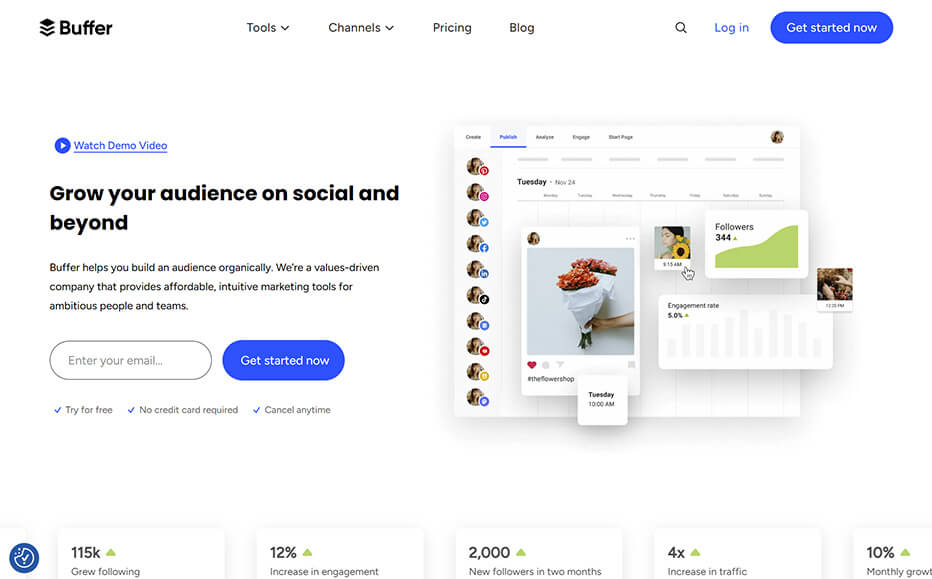
Everyone needs a social media presence these days, and Buffer helps you plan every element of your posts across 11 different social channels. Simple scheduling tools make it easy to organize your posting schedule for consistent engagement, and the new AI assistant can even help you by generating new post ideas, rewriting your post text for clarity, or even translating your posts automatically for global markets.
Buffer is available through the web and on Android/iOS mobile devices.
| Pros | Cons |
|---|---|
| Free plan includes AI tools | Very expensive for multi-channel campaigns |
| Integrated translation support for global markets | |
| Supports the popular new Bluesky app |
Pricing
Paid plans start at $5 USD per social channel per month. A free plan limited to 3 social channels is also available, although it includes access to Buffer's AI tools.
8. Microsoft OneNote - Best for multimedia notes
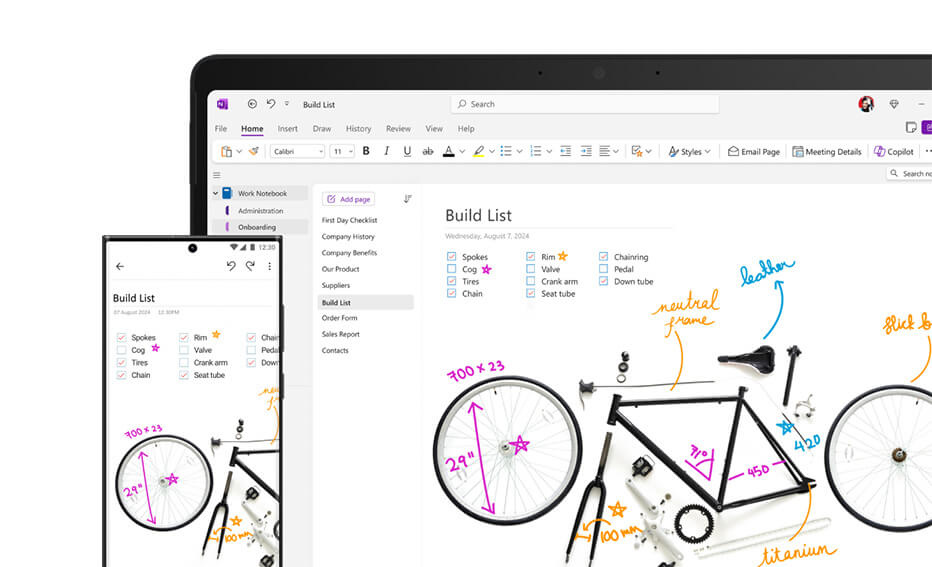
OneNote is a powerful and flexible note-taking app available free from Microsoft. It supports almost any type of note, from standard typed notes to handwriting to voice dictation. You can save articles, images, and other content from the web and add them directly to a note using the helpful web clipper tool. Each notebook page has an infinite canvas, so you can organize note contents visually to highlight connections.
Notebooks can be stored on OneDrive for syncing between multiple devices or Sharepoint servers for collaborative editing with your team. OneNote is available on the web, as an Android/iOS mobile app, and as a desktop app for Windows and macOS.
| Pros | Cons |
|---|---|
| Supports collaborative editing | No mind-mapping tool |
| Integrates with OneDrive for cross-device syncing | |
| Free for any use on all platforms |
Pricing
OneNote is free to use on all platforms but you need Microsoft 365 subscription for more storage.
9. Apple Reminders - Best for Apple fans
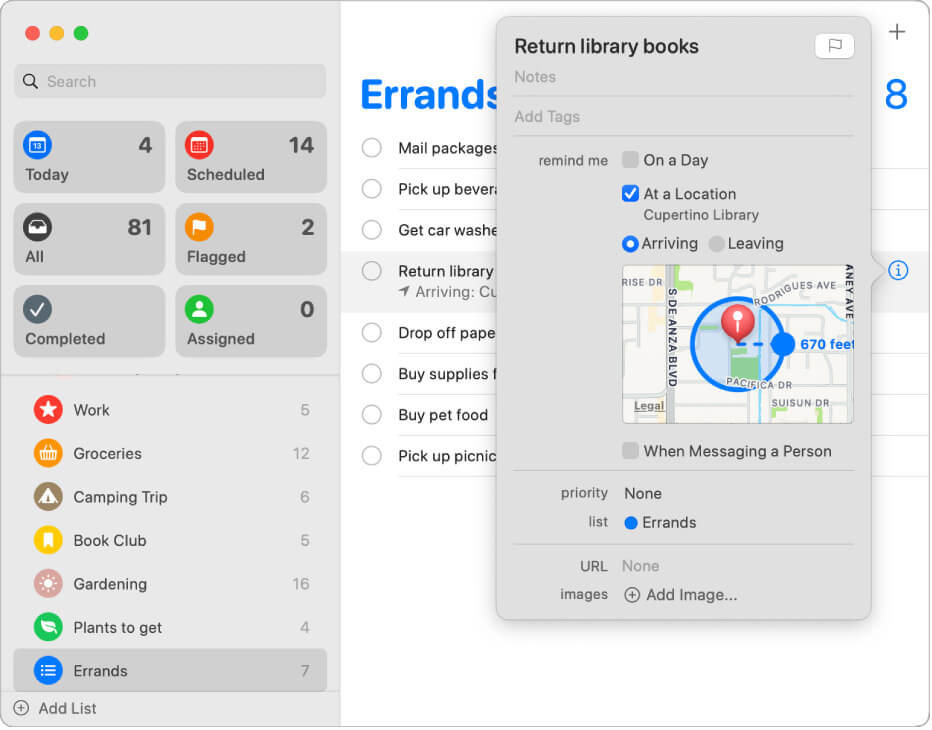
Many people overlook it, but the humble Reminders tool that is built into Apple devices has plenty of handy features that make it an excellent organizational app for tracking tasks. Creating new reminders using Siri is fast and straightforward, and you can add custom alerts with an impressive range of triggering events. When used with a GPS-equipped mobile device, it can even alert you when you arrive or leave a specific location.
Even with its new Apple Intelligence upgrade, Siri doesn't always get things right, but it's easy enough to correct issues.
| Pros | Cons |
|---|---|
| Free for all Apple users | Only available on Apple devices |
| Integrates with Siri to create reminders | |
| Syncs across all Apple devices |
Pricing
Apple Reminders is free to use but only available on Apple devices.
10. Zapier - Best for automating tasks
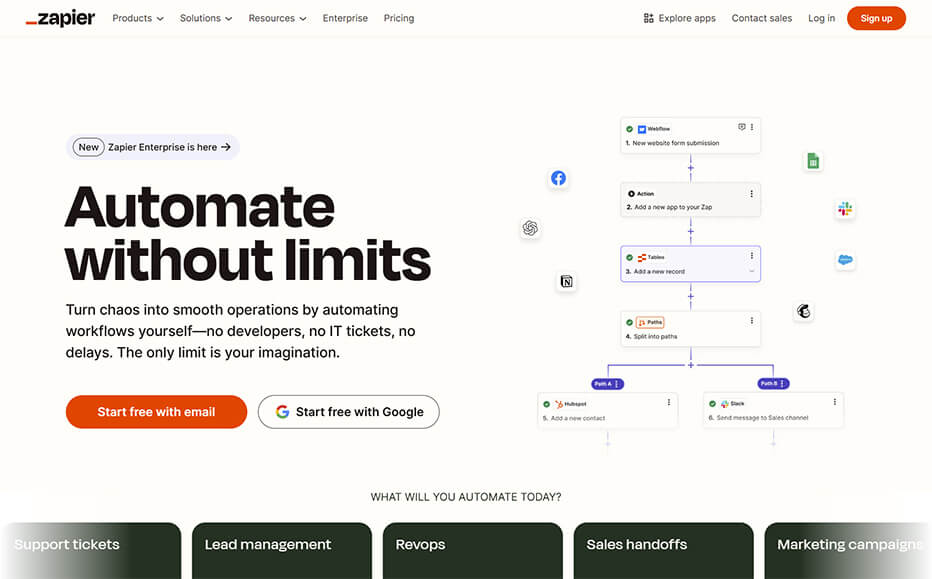
If you're relentlessly focused on productivity, Zapier will seem like a dream come true. It allows you to automate multi-step processes across different apps to save time and ensure you never forget a key task. For example, when you receive a new lead prospect email with a specific keyword, Zapier can connect with an AI tool of your choice to draft an email response, create a new record in your CRM with the lead data, and notify your sales team automatically.
If this sounds complicated, you're not wrong - but once you've set up a workflow, it stays entirely automated and never misses a step. To simplify the process, Zapier includes an AI tool that accepts natural language prompts and recommends a series of automation steps.
Zapier is only available through the web interface, but it isn't well-suited to the small screen of a mobile device.
| Pros | Cons |
|---|---|
| Supports over 7000 apps | Expensive for use with large teams |
| No programming knowledge required | |
| AI tool for suggesting automation steps |
Pricing
Zapier’s plans start at $19.95 USD per month and scale up based on usage. A limited free plan is also available.
Use Notta's AI transcription tool to quickly and easily transcribe audio and videos. We guarantee accuracy and ease of use.
Choose the best apps to stay organized
Staying organized is a difficult task at the best of times, but finding the right app to help you can make a huge difference in your attitude and your success. Here are a few questions and tips to help you select the best app:
Is this for work or your personal life? Many personal organization apps are free but lack some of the more advanced tools like AI assistants found in paid apps. If you want to track complex personal projects, you should also consider apps that are typically pitched toward businesses.
Are you willing to invest time in setting up a system? Some organization apps are designed to be flexible enough to accommodate a range of use cases, but this can make it difficult to decide how to use each feature most effectively. Decide if you want to follow someone else's organization system or create your own from scratch.
Does it support your favorite devices? Most organization apps have a web interface and a mobile app, but not all of them. Ensure that the app you're considering is available on all your devices, or you may never actually use it.
Try multiple options. Organization is a very personal process; a system that works for one person may not work for another. If the first app you explore doesn't suit you, there's usually another option available, so take the time to try several different solutions.
Conclusion
Organization apps are essential for surviving and thriving in the modern world. Whether you need to keep track of key details, regain control of your time, or ensure you never forget an important task, there's an organization app perfectly suited to your needs. Finding the right organizational system may take a few attempts, but the potential benefits make it worth your time to test your options.